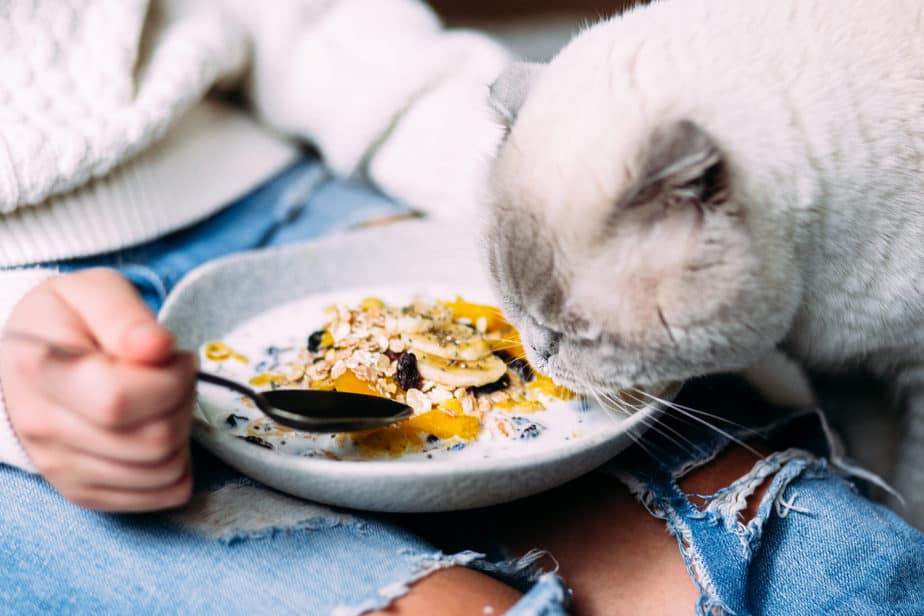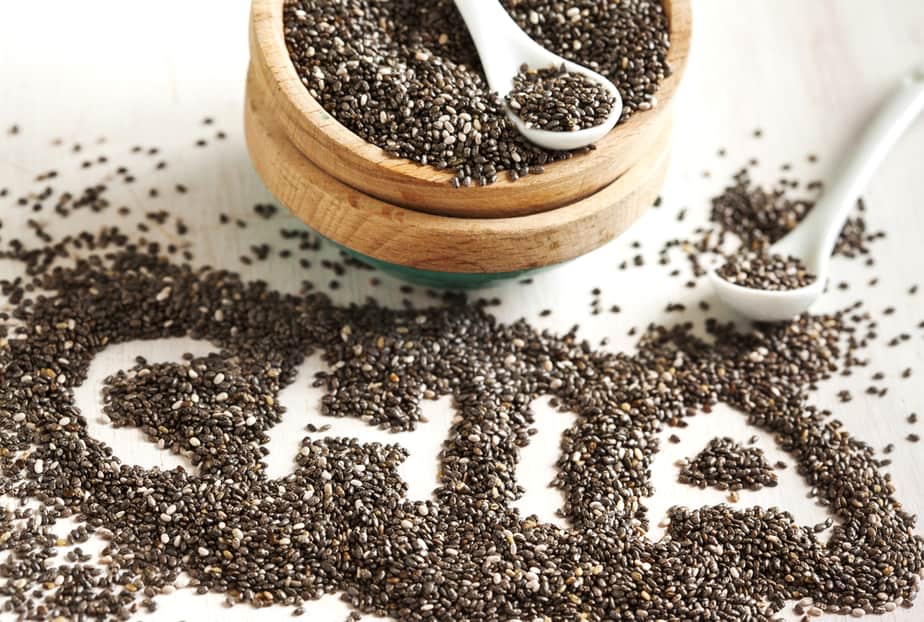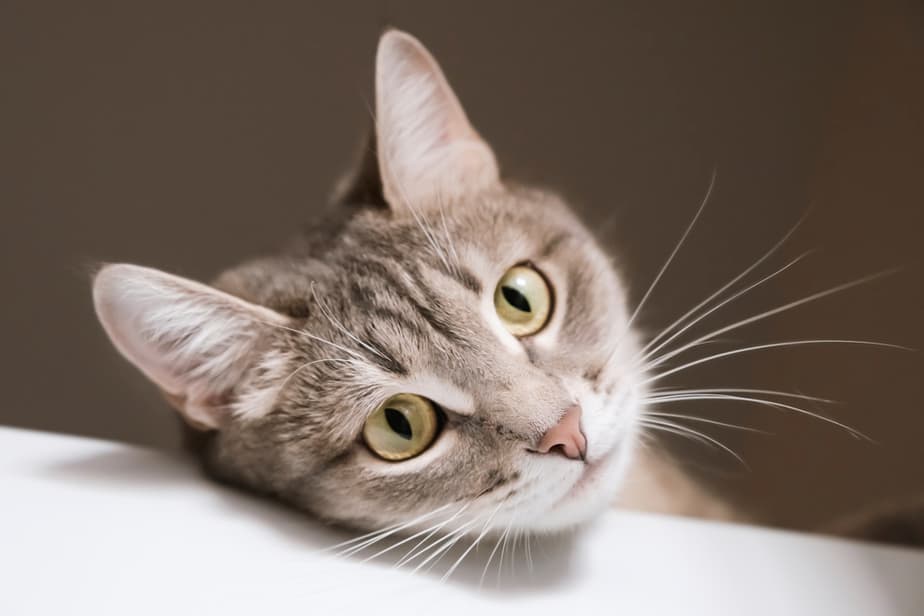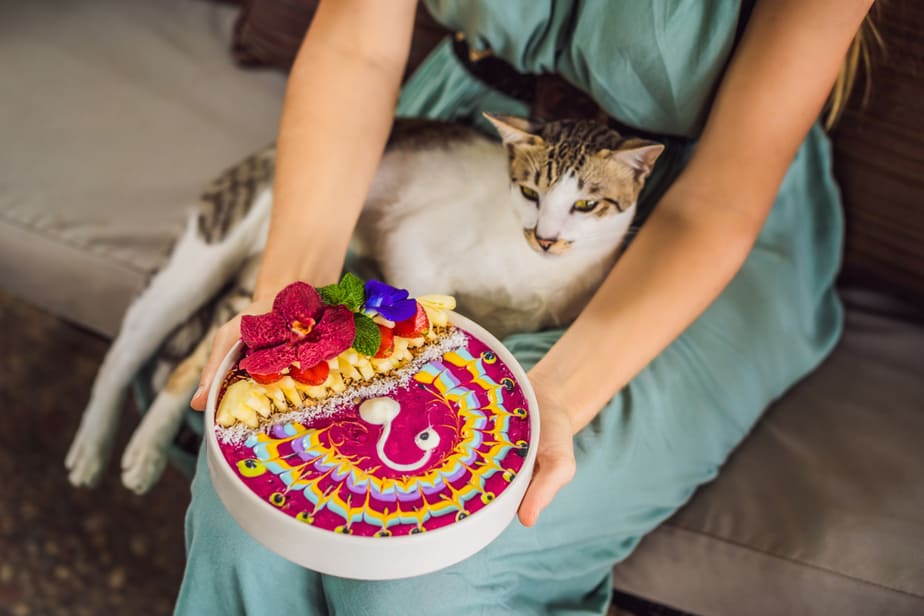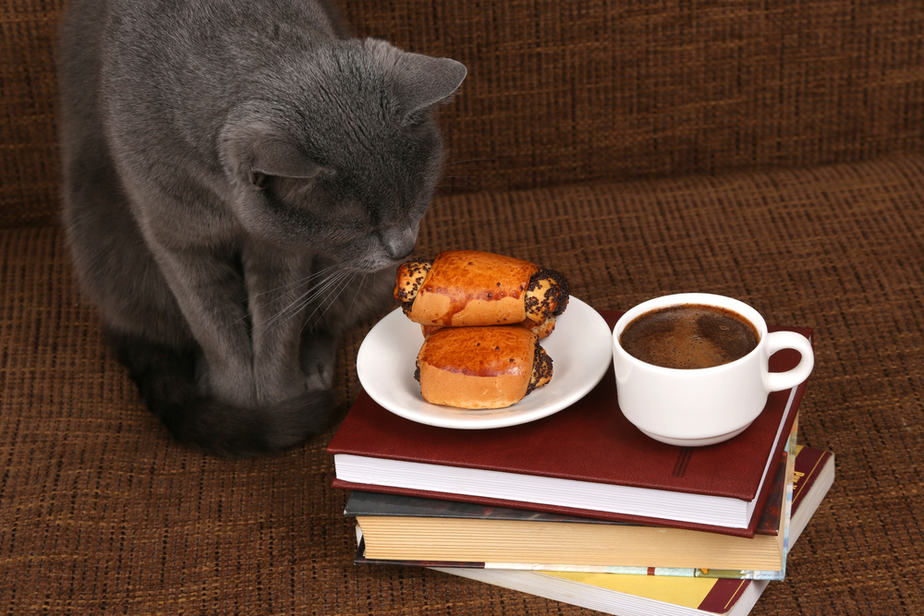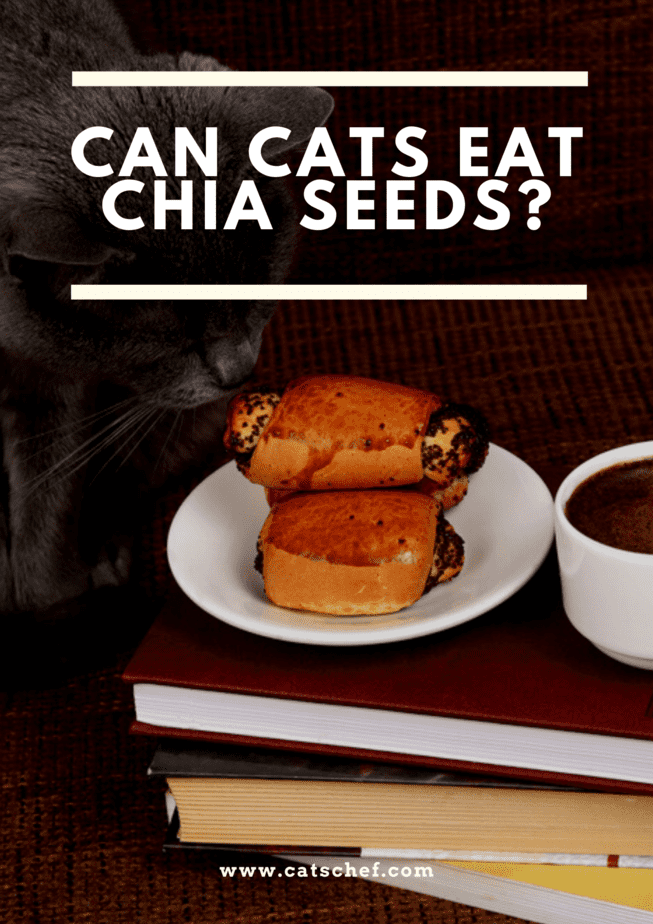📖 Table of Content:
- What are chia seeds?
- The content of chia seeds
- Health benefits of chia seeds
- How do I feed chia seeds to my cat?
- Can cats eat dry chia seeds?
- Can my cat eat chia seeds in smoothies?
- Can cats eat puddings with chia seeds?
- What about baked goods with chia seeds?
- Granola/protein/energy bars with chia seeds
- To sum up
Chia seeds are a perfect example that size doesn’t matter. They have been a part of humans’ lives for a long time now. Chia seeds are a health bomb and, to get straight to the point, cats can safely eat them.
These small seeds aren’t a modern-day thing. Maya and Aztecs are known to have consumed them, and they were the greatest people back then!
Nowadays, some of the popular ways we like to eat chia seeds are in smoothies, puddings, baked goods, and granola/protein/energy bars. So, what’s the fuss with these miniature seeds, and how can your cat eat them safely so she can benefit too?
What are chia seeds?
Chia seeds are an all-purpose bundle of many healthy nutrients. Their jelly consistency mixes perfectly with other foods. Incredibly rich in supplements, chia seeds aren’t only recommended for your cat.
Both you and your furry friend can benefit greatly from these teeny yet vital sources of nutrition. Stick with us to see why these seeds are so beneficial to your feline.
The content of chia seeds
These powerful seeds contain an array of high-value nutrients. All of which can benefit your feline greatly. This is one of the reasons cats can eat chia seeds.
Chia seeds are a fountain of minerals, vitamins, as well as omega-3 fatty acids. These seeds are also rich in antioxidants such as kaempferol, caffeic acid, chlorogenic acid, quercetin, and myricetin.
Health benefits of chia seeds
If you incorporate chia seeds in your cat’s diet, you can expect her immune system to boom. Not only can cats eat chia seeds, but it’s also a highly supported choice.
Containing plentiful vitamins and minerals, chia seeds are a remarkable way for your feline to thrive. The vitamins that claim importance are vitamin A, folate, niacin, to name a few.
1. Vitamins
Vitamin A is important for your feline’s health, especially her eyesight. Poor eyesight can be a result of vitamin A deficiency. Fortunately, chia seeds contain an abundance of this vitamin.
One of the first clues that your cat’s lacking this vitamin is night blindness. To make sure your cat is sharp in the dark, try to incorporate chia seeds into her diet.
Folate, a B vitamin, is of great significance to felines. A lack of this vitamin could result in some serious health issues. Folic acid prevents anemia by helping her body make red blood cells.
More specifically, this health condition is called folate-deficiency anemia. To prevent this from occurring, a few chia seeds here and there will do the job.
B3 or niacin influences your feline’s body greatly. It helps turn food into energy and creates fats and cholesterol. Niacin can improve your feline’s circulation and keep the nervous system running.
2. Minerals
Minerals are important body supplements for your four-legged companion. She can benefit greatly from the amount of potassium found in chia seeds.
Potassium helps a cat’s nervous system function properly. This mineral also helps with muscle contractions and can prevent heart palpitations.
Iron found in chia seeds helps keep your feline’s blood cells in order. This supplement helps carry oxygen throughout the body.
And another important mineral for your cat’s immune system is magnesium. It can also help with muscle contractions and play an important role in the nervous system as well. Next to magnesium and iron, selenium is a crucial part of your feline, and is found in chia seeds.
How do I feed chia seeds to my cat?
Because of their enormous nutritional value, chia seeds are recommended as a replacement for your cat’s treats. Although these benefit your feline’s health, it’s best you introduce them slowly.
You may opt to soak them before feeding them to your fluff. But it’s probably not even necessary if you just mix it with her wet food.
A teaspoon of chia seeds a day will keep the vet away! Don’t get carried away with this booster food though. Although a great addition to your cat’s diet, they can’t replace the meat she needs.
Cats are carnivores and can sometimes have a hard time digesting plant-based foods. Look out for any signs of your cat having troubles getting accustomed to this food.
If your feline showcases symptoms of gastric distress (such as gas, vomiting, and diarrhea), make sure you talk to your vet and try a slower introduction.
Can cats eat dry chia seeds?
Yes, cats can eat dry chia seeds. But, be careful. Dry chia seeds aren’t usually recommended. The reason behind this is water absorption.
Dry chia seeds, when ingested, can absorb water from your feline’s body. Therefore, it can make her bloated and even result in intestinal tract blockage.
A soaked tablespoon of chia seeds can do wonders for your feline. Just submerge in water to soak. Once they start to expand, you can then add them to your cat’s bowl.
The other good news is that chia seeds are rather bland-tasting. While this doesn’t sound like a plus point, this means if you have a picky eater, it won’t be a problem. These tiny seeds can fit into every meal!
Can my cat eat chia seeds in smoothies?
So, what about smoothies? Are they safe for our pets?
Yes, cats can eat chia seeds in smoothies, but in moderation. Smoothies are a great way of consuming healthy nutrients. Chewing can sometimes become boring, right?
Also, there are certain fruits your cat can’t have, like grapes and cherries. Raisins are off-limits as well. However, you can mix up some peaches, blueberries, strawberries, and even watermelon for your feline.
These smoothies are a great treat for your cat if made with non-dairy milk. Contrary to popular belief, regular milk is known to cause diarrhea in felines.
Although this treat could be refreshing, remember that treats must only make up around 10% of your cat’s diet.
Can cats eat puddings with chia seeds?
Chia seeds are a great addition to pudding. Yet, when it comes to your four-legged friend, you should be wary about pudding. It contains all of the ingredients that, although nontoxic, won’t benefit your feline’s health.
Pudding is typically made out of milk, cornstarch, sugar, and other ingredients that vets don’t recommend. While a few licks won’t hurt your cat, they could cause digestive problems if taken occasionally.
So, puddings aren’t incredibly harmful to your cat. But probably the only good part about them is the chia seeds.
What about baked goods with chia seeds?
The smell of fresh bread wafting through the kitchen and our eager stomachs are a match made in heaven. However, baked goods are made out of dough and batter.
They also contain other ingredients such as salt, which are of no benefit to cats. Although small amounts won’t hurt your feline, she won’t get any nutrients from it.
Baked goods are an abundance of carbohydrates. Due to your cat’s demand for protein, carbs just won’t do the job. While chia seeds can be an amazing bonus to bread, it’s the only beneficial part for your cat.
Cats don’t need baked goods in their diet, especially flavored ones. It’s for the best to stick with plain chia seeds in your kitty’s meals.
Granola/protein/energy bars with chia seeds
These quick sources of energy may be a useful snack for you. Yet, it’s best if cats avoid them. Even though some of them contain chia seeds, it’s not enough to dominate over the harmful ingredients.
Granola bars’ primary ingredients are whole grains. These are non-toxic to your feline, but should still be avoided. Cats are predators, meaning they survive and thrive off of meat.
Although grains are safe for her, she won’t get the needed nutritional value from them. These are often just a filler to the cat food.
Another reason your cat shouldn’t eat energy or granola bars is the fruit and sugar content. Some fruits are safe for your cat, of course. But not these kinds of processed ones.
Besides fruits, frequent intake of these sugar-filled snacks can cause feline obesity and diabetes. Alongside these disadvantages, protein and other bars contain a range of nuts.
Almonds, pecans, as well as peanuts and walnuts, are high in fat. High consumption thereof may cause your cat to suffer from vomiting and diarrhea.
In this case, sharing isn’t caring. Rather provide some feline-appropriate treats so she won’t need to risk eating yours.
To sum up
Chia seeds are a valuable addition to your cat’s diet. Try mixing them in her food or soaking them before feeding.
These tiny boosters are great for your cat’s overall health and will help to make her coat shine and claws sharp. Just keep in mind these treats are best given in moderation.
About a teaspoon a day sprinkled on your cat’s meal will do the job. Still, don’t try replacing your feline’s regular diet with these. Cats can eat chia seeds, but only as a supplement.
Read more: Can Cats Eat Graham Crackers? Read Before You Feed
